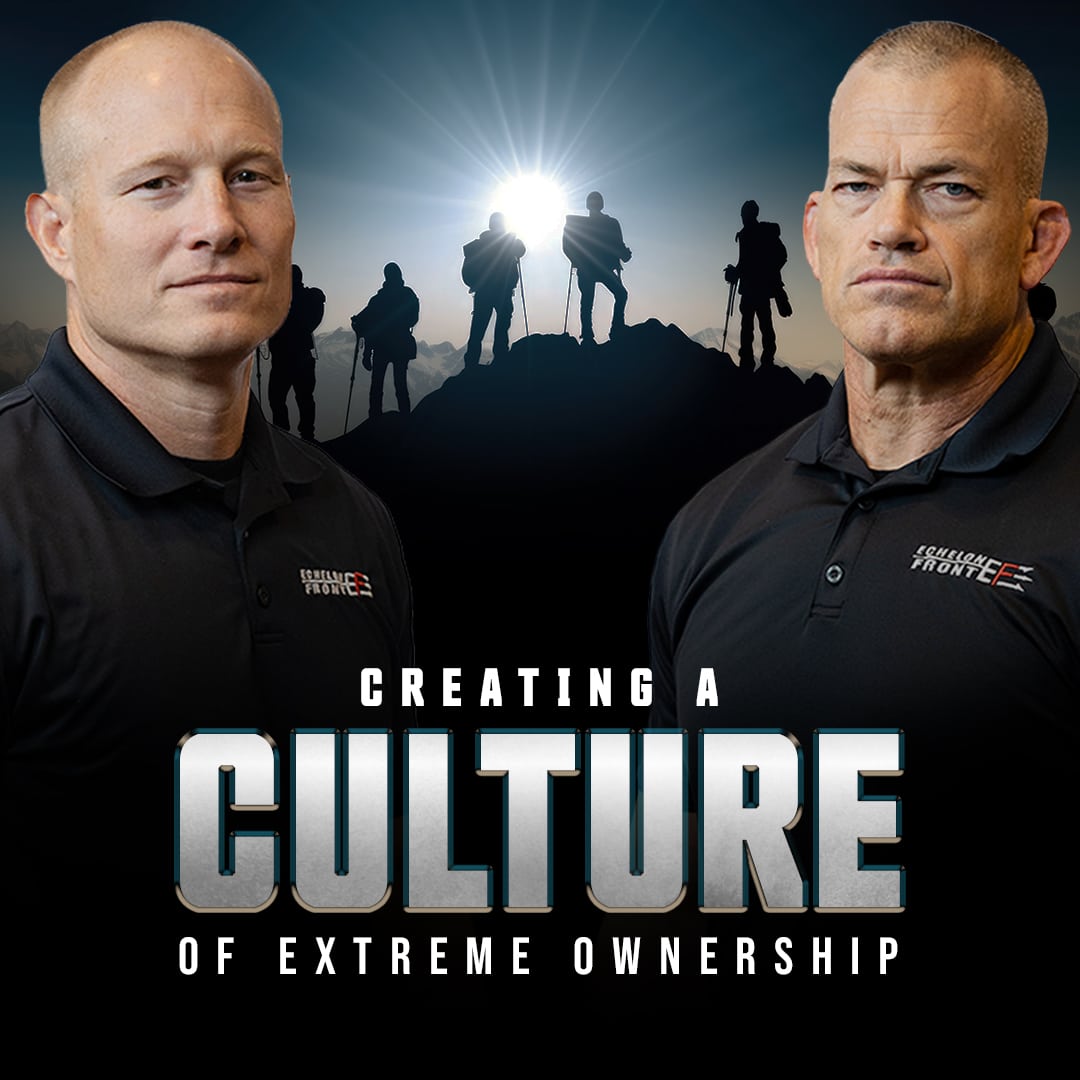“If you really feel like you need to make a statement that you know has some value, instead of making a statement. Try asking a question.” -Jocko Willink, Standard Directive 013
Intro: Not Just Questions. Earnest Questions.
Asking questions is a core component of almost every tactic and strategy we teach at Echelon Front. The Indirect Approach, the readback, and the debrief, to name a few.
However, an important distinction must be made, and that is what we mean by “asking questions.”
The questions we are talking about aren’t just sentences that have question marks at the end of them.
What we are talking about is what we call an EARNEST question. An earnest question is one that is designed to truly understand another person’s perspective. It is a question that you ask with the mindset and expectation that the person you are asking must know something that you do not. That you must somehow be wrong. That you must be missing something.
Only when you have convinced yourself that you have something to learn from the other person will your mind open such that the question you are asking will be earnest. Only then can you put to use the information that you receive.
So, before you ask any questions of anyone, you must ensure that the questions you ask will be earnest questions. Otherwise, everything that follows will be for naught.
Three Reasons Why Asking Questions is Important
One could write an entire book about the importance of asking questions in leadership. However, for this article, we will focus on three.
Questions Help Create Alignment
The first reason is that questions help to create alignment on the team. In order for teamwork to be effective, the team has to have unified strategic goals, and they must be aligned in their efforts toward those goals. If the team isn’t aligned on where they are going and how they are going to get there, then over time, they will become so separated that they won’t be able to cover and move and support each other.
As a leader, it is essential for you to ensure that such alignment exists. And, the reality of life is that, as much as we would like to be, we are not mind readers. The only way that we can know what another person is thinking is if they tell us in their own words.
Additionally, one of the most important things for a leader to know on the battlefield is where they are. The way that this looks with alignment is that the leader must know what the team thinks the unified strategic goal is. They must know where the team thinks they are with respect to it, and they must know what the team thinks the priorities and steps are to get there.
Thus, given that we aren’t mind readers, the only way for a leader to find out this information is to ask questions.
Lastly, one of the most powerful tools that all leaders can utilize to ensure alignment is relationships. The better relationships you have with other people, the better your communication will be, the better you will know what support they need, and the better aligned you will be. And, asking questions is an act that any leader can use to build all five of the components of a relationship. When you ask questions, you will show the other person you are listening. You will be giving them respect. You will build trust. You will gain influence. And you will show them that you care.
If you want to be aligned with your team, ask earnest questions.
Questions Disengage the Ego
The number one disruptor of any leadership effort is the ego. The ego will convince people to forget about the larger team and focus on themselves. The ego will close your ears to communication. The ego will blind you to what your true priorities are. The ego will convince you that you need to retain as much power and control as possible. And, most destructively, the ego will cause you to believe that the source of all of your problems is anyone but yourself.
A core component of leadership is human nature. The destructive force in the ego is one that exists in the nature of all human beings. It is a little voice in your head constantly waiting for a reason to disrupt. It will turn on any time it detects the slightest hint of accusations, anything it can interpret as offensive or insulting, or anything that will take away from the validation that the ego is seeking. And, when the ego turns on, the ears and the mind turn off.
Thus, it is vital, in everything we do, not to engage the ego. And, one of the best tools we can utilize to communicate with other people without engaging their ego is asking earnest questions.
When you ask an earnest question to someone, you are telling them that you want to listen to them. This gives their ego the validation it seeks. When you ask an earnest question, there is no accusation because you are truly trying to learn about the other person’s thought process. And, when you ask an earnest question, there is no offense or insult because you are acknowledging that you are the one who is wrong, not the other person.
Finally, it is important to remember that you are not only concerned about the other person’s ego. Asking earnest questions also disengages your own ego. When you ask an earnest question, you will be forced to open your mind. When you open your mind, your ego will be silenced by your own acknowledgment that you don’t know the answer.
So, ask earnest questions to open your mind.
Questions Help the Team Improve
In order to reach our greatest potential as individuals, and as teams, we have to seek to be constantly and consistently making small improvements. And, as leaders, it is our responsibility to help our team do this. The fact is, no matter how good a person is at their job, mistakes will get made. And ultimately, every person can always be a little better.
And, once again, the question is the foundational tool that leaders must use to help train and develop their team. Because in order to guide a person or a team toward improvement, you have to once again find out where they are and gain their perspective. And, once again, you are not a mind reader. So, the only way you can find out why they did something wrong, or find out what knowledge they have and what knowledge and training they need, is to ask them.
You have to ask them how they thought things went. You have to ask them what their thought process was. You have to ask them what they think they can do better next time. You need to ask them what support they need from you. Only once you understand what is going on inside their head can you hope to provide them with the training and mentorship they need to improve for the future. Asking questions in this way is the process by which we conduct one of the most powerful tools of leadership: the debrief.
Additionally, one of the most powerful questions you can ask as a leader is, “What do you think you should do?” When you ask this question, you are providing an opportunity for ownership and leadership but in an environment of support and mentorship. In such an environment, your team will be much more likely to make suggestions, try something new, and develop the instinct to act and lead.
Lastly, it is vital to ask questions of your team to help them improve, and you must always ask yourself questions as well so that you can work to improve yourself for the betterment of the team.
If you want to see improvement, ask earnest questions.
Why Don’t We Ask Questions?
Given that questions are such a powerful tool in the leader’s tool belt, it would seem that every leader would be chomping at the bit to ask as many as they can as often as they can. However, unfortunately, it is not our tendency to ask questions. It is a skill we must develop and practice.
What prevents us from using such a powerful tool? Again, an entire book could be written on the subject, but we will focus on three reasons that all center around other natural human tendencies.
First, it is our tendency to want to be direct. It is worn as a badge of honor to say the phrase, “I am a direct person,” or “I just tell people like it is.” However, a multitude of experiences show us that directness is very rarely the most effective means of communication. In fact, the indirect approach is almost always the best way to achieve strategic victory. The problem is, the indirect approach and asking questions is, at least at first, more challenging.
This leads us to our second tendency, which is the tendency to take the easy path. Human beings, like other animals, evolved to take the easiest path to ensure survival. However, just like a prey animal taking an easy trail right into the jaws of a predator, human beings often take the easy path straight to their own destruction. We have to remind ourselves that while asking earnest questions may be more difficult, it is almost always the most effective approach for both you and the team.
Lastly, the ego. The ego will prevent us from asking questions because it doesn’t want to be seen as ignorant. It doesn’t want to be embarrassed. It doesn’t want everyone else to look at us and wonder why we just aren’t getting it. But what is worse? Asking a question and admitting you didn’t understand, or getting halfway through a project making a bunch of mistakes, getting behind, and not knowing what to do because you refrained from asking the right questions at the right time? The ego will also convince you that you don’t even need to ask questions because you already know the answer. It will make you think that you have knowledge that you don’t have. And, when you have all the answers, what is the utility of asking questions? You can only overcome this by developing the mindset that you do not know and never will be guaranteed to have the only answer to any problem you face.
Conclusion
There is a reason that questions are the core component in so many of the strategies and tactics of leadership that we teach. One of the most important things you can do as a leader is listen. And questions are the most effective means to getting other people to talk.




